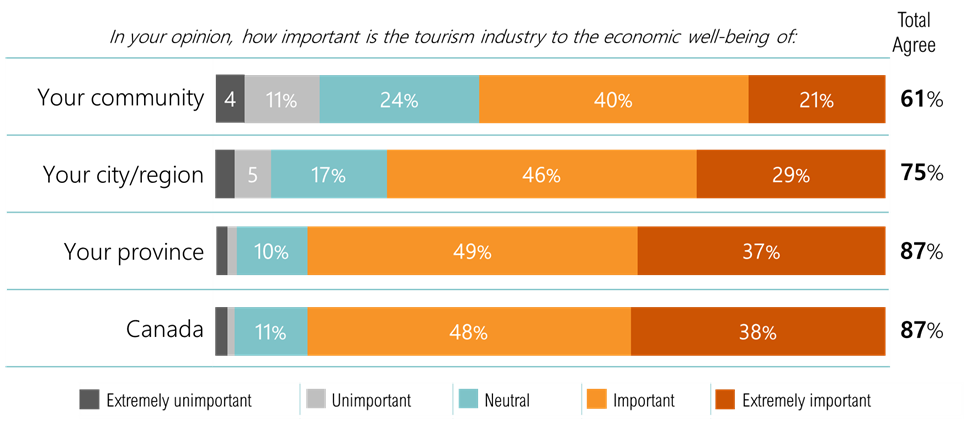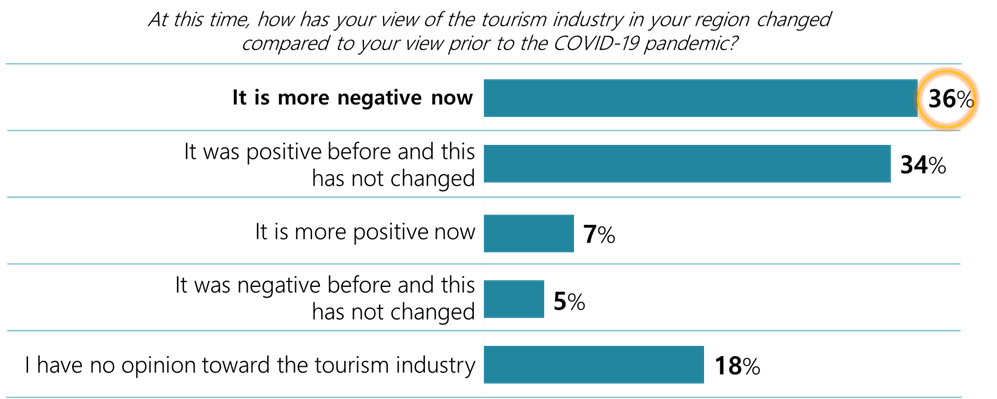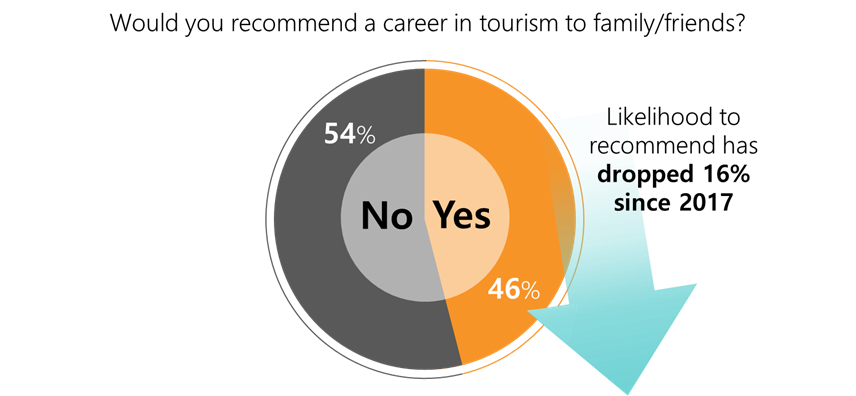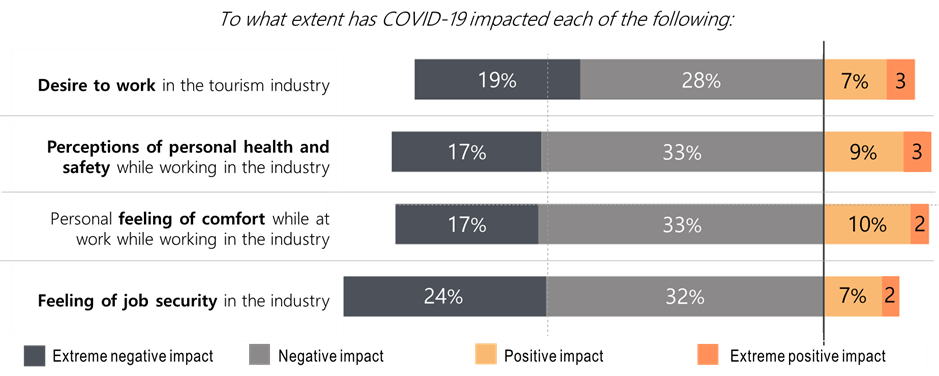In 2017, Tourism HR Canada published the results of a survey asking Canadians about their perceptions of the tourism sector as a place of work. It showed that Canadians viewed many aspects of tourism positively, but held negative views as well. Many respondents had positive perceptions of tourism and would recommend it as a place of employment. However, the survey results also pointed to challenges for the sector. Widespread negative perceptions regarding wages and careers presented a significant challenge to attracting people to tourism employment.
Jump forward four years, and tourism is the industry hardest hit by COVID-19. In December 2020, the sector employed 450,000 fewer tourism workers than before the pandemic. The number of active tourism businesses operating in October was 8,300 fewer than one year prior. Employers are concerned about their business’s future viability, and employees are worried about their job’s future viability. A people-centric sector, most tourism jobs require face-to-face contact with customers and other employees. Although tourism businesses have not been a major vector of infection thanks to stringent protocols, tourism employees cannot work from home. The potential for infection is there.
In light of this, it was time to assess how COVID-19 has affected Canadians’ perceptions of tourism as an industry and as a place to work and build a career.
Leger conducted two surveys on behalf of Tourism HR Canada. One surveyed 1,500 Canadians on their general sentiments towards tourism as an economic driver for Canada and their community. The second, a web survey of 5,055 Canadians, ran from November 6 to November 29, 2020. Sampling included representation from key target audiences of young people, Indigenous Canadians, visible minorities, and new immigrants.
- [popup_anything id=”10512″]
- [popup_anything id=”10511″]
Resident Sentiment Survey
The sentiment survey found that Canadians are receptive to tourism as a driver of the economy. They want visitors to come to Canada and have an enjoyable experience, and they enjoy making visitors feel welcome.
Nearly nine in ten Canadians believe that the tourism industry is important to their province and Canada’s economic well-being. Conversely, fewer Canadians see the economic benefits of tourism to their community. But a majority still believe it is important.
While overall sentiment toward the sector is generally positive, the pandemic has had an impact; a little over one-third of Canadians reported that their perceptions of the tourism industry have become increasingly negative since the beginning of the pandemic.
A minority of Canadians also believe that the current number of visitors is putting too much pressure on Canada’s society, infrastructure, and environment (an increase of five percentage points since 2017). When Canadians were asked four years ago why visitors were a source of pressure, many issues were cited, with no single issue more prominent than any other. In the 2020 survey, the possible spread of COVID-19 was far and away the most cited reason for tourism creating pressure on society.
With vaccines being delivered, travel demand will start to recover in 2021. Due to pent-up demand, an initial surge could occur when people can first travel freely. In the late fall of 2020, we projected that the number of full-year tourism jobs could rebound to 1.65 million in 2021. Whether the sector will have enough workers to fill these jobs upon recovery is another question. The industry has lost hundreds of thousands of workers. Many are still unemployed, but others have sought and found work in other sectors.
[popup_anything id=”10512″]
Assessing Perceptions of Tourism as a Place of Employment in Canada
The sentiment towards tourism as a place of work has also taken a negative turn.
The second of the two surveys took a detailed look at Canadians’ perceptions of tourism as a place of work. Leger surveyed five thousand Canadians in November. Twenty percent of respondents had worked in the tourism sector in the past, and six percent were currently working in the sector.
On the positive side, Canadians see working in tourism as an invaluable opportunity to learn a range of soft skills—skills that are important regardless of the career path one takes. For those interested in our sector as a place of work, social interaction was a key attractor.
Results revealed that 46% of respondents would recommend a career in tourism to family/friends, which is a drop of 16 percentage points since 2017 when 62% of Canadians said they would recommend tourism as a career.
In our 2017 survey, we found that respondents who had worked in tourism were more likely to recommend a career in tourism (68%) than those who had not worked in tourism (62%).
In the latest study, we saw a similar trend. While only 46% of Canadians are now willing to recommend a career in tourism, 63% of those who work or had worked in tourism would still recommend a tourism career to family/friends. Even though people working in tourism are more likely to say that the pandemic has negatively affected their perception of the industry, they are still willing to recommend the industry as a place of work to others.
Importantly, 17% of those who had worked in tourism strongly agreed with the statement “I view tourism as an excellent career opportunity”, compared to 10% for the overall sample.
But the results show impending challenges when the sector seeks to restart and restaff. Many Canadians were not interested in working in the industry, and earnings potential was a key concern. Fifty percent of respondents noted that they negatively view the tourism industry, with 39% indicating that their perception is more negative than before the COVID-19 pandemic. Among Canadians, the desirability of a career in the sector is also much lower than it was before COVID-19.
Significantly, respondents who had worked in tourism were significantly more likely to indicate that their view of the industry is more negative now (50%). They have less desire to work in tourism. Their perceptions of personal health and safety have been negatively affected, and they feel less comfortable while working. Not surprisingly, their feeling of job security has taken a very significant hit.
We must address the concerns of individuals who have worked in the tourism industry. These individuals serve as ambassadors/spokespeople for the industry. If these individuals have a negative perception of the industry, they may dissuade others from pursuing a career in tourism.
This research indicates that consumer and worker sentiment is waning. Tourism employment is viewed as precarious, risky, and unsafe. While overall sentiment towards tourism is positive, Canadians are more uncertain if the economic and social benefits of tourism outweigh the risks. As we recover, the sector will need to demonstrate good practices that increase consumer confidence, and invest in developing and promoting careers in tourism.
[popup_anything id=”10511″]




